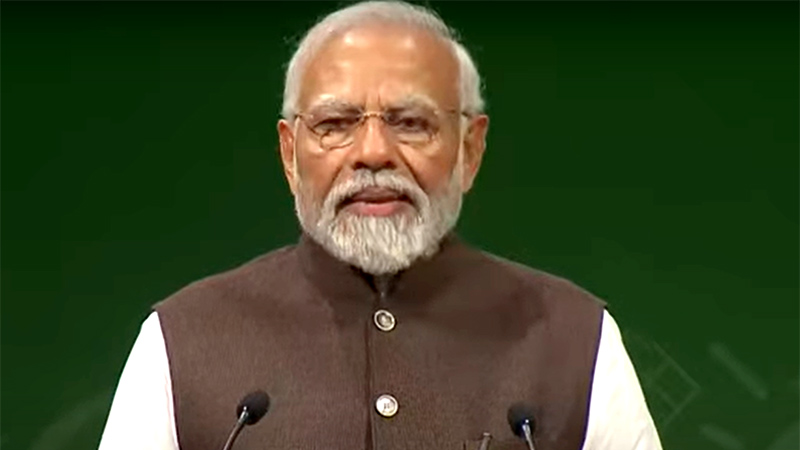The relationship between India and UAE is founded on multiple pillars, said Indian Prime Minister Narendra Modi. The two countries are leaders in global renewable energy initiatives and share a vision of promoting sustainability, he added. He was speaking at an interview with Aletihad, the Arabic newspaper from the UAE, on November 30, on the sidelines of the UAE-hosted COP28 summit in Dubai.
Modi stressed that the inclusion of climate change in the India-UAE joint statement reflects the commitment of the two nations to the cause. He expressed hope that COP28 will bring fresh impetus to climate action and cooperation in taking forward the goals of the United Nations Framework Convention on Climate Change (UNFCCC) and the Paris Agreement. Modi recalled his meeting with the UAE President, His Highness Sheikh Mohammed bin Zayed Al Nahyan in the UAE in July this year, and during Sheikh Mohammed bin Zayed’s visit to New Delhi in September for the G20 Summit hosted under India’s Presidency.
India’s partnership with the UAE in this key area is going from strength to strength, driven by a futuristic vision, Modi said. He hoped that India and the UAE, can join forces to enhance energy security, leveraging each other’s strengths, and providing support to the International Solar Alliance’s Global Solar Facility. “India and the UAE stand as partners in shaping a greener and more prosperous future, and we remain steadfast in our joint efforts to influence the global discourse on climate action,” Modi said.
The Indian PM said that climate change is a collective challenge that demands unified global response. “It is essential to recognise that developing countries have not contributed in the creation of the problem. Yet developing countries are willing to be a part of the solution,” Modi said. “But, they cannot contribute without access to the financing and technology needed … I have therefore advocated strongly for global cooperation for ensuring requisite climate financing and technology transfer,” he added. He stressed on the importance of ensuring that climate financing flows to the developing world in a practical, assured manner.
Climate action must be based on equity, climate justice, shared obligations and shared capacities. “By adhering to these principles, we can forge a path toward a sustainable future that leaves no one behind,” Modi added. He stressed that as nations pursue climate action, “we must ensure that development priorities of the Global South are not compromised”.
“We have had robust cooperation in the area of renewables since 2014, and during my visit to the UAE in July this year, we resolved to take forward our cooperation in green hydrogen, solar energy and grid connectivity,” Modi said delving into the ‘futuristic vision’ driving India’s partnership with the UAE in the climate domain. “We appreciate the significant investments the UAE has made in India’s renewable energy projects, particularly in the solar and wind sectors.” He highlighted the opportunity to work together on technology development, the formulation of mutually beneficial policy frameworks and regulations, investments in renewable infrastructure, and capacity building in the fields of green hydrogen and green ammonia.
Modi praised the UAE’s unwavering commitment to climate action within the renewable sector, which he said is exemplified in its role as the host country for the International Renewable Energy Agency (IRENA).
“I have been told that the UAE has taken multiple progressive steps on sustainable growth in the form of large solar parks, ‘Green Building Regulations’ for private sector construction, programmes for increase in energy efficiency, development of smart cities, among others,” Modi said.
Mission LiFE
“India has launched a Global Mission on sustainable lifestyles – ‘LiFE, Lifestyle for Environment’ – that motivates the world to adopt an environmentally friendly lifestyle,” Modi said. “My call for Mission LiFE is based on the belief that a mass movement of pro-planet lifestyles and choices can contribute significantly towards global climate action.” In this vein, India has conceptualised the “Green Credit Initiative”, to incentivise voluntary, pro-planet actions that can respond to climate change. India is set to officially launch the Green Credit Initiative alongside the UAE during a high-level event during COP28.
“I am glad that UAE is co-hosting with us a high-level event to inaugurate this ‘Green Credit Initiative’ for global collaboration,” he added. India has made considerable strides in its green energy projects, furthering the country’s sustainability efforts, Modi said.
The Indian PM also identified green hydrogen and green ammonia projects as a key area of potential future cooperation between the two countries, in addition to the establishment of Green Hydrogen Corridors to connect markets from India through the UAE, the Mediterranean, and beyond.
‘Panchamrit’
India has demonstrated by example that the country is at the forefront of doing its part to address climate change, Modi said. “At COP26, I presented ‘Panchamrit’ – five ambitious commitments of India – as our contribution to global climate action,” he added. They include: reaching 500GW Non-fossil energy capacity by 2030; ensuring 50% of its energy requirements are met by renewable energy sources by 2030; reducing the total projected carbon emissions by 1 billion tonnes between now and 2030; reducing the carbon intensity of the economy by 45% by 2030 over 2005 levels; and achieving the target of net zero emissions by 2070.
He also brought attention to the first Global Stocktake envisaged during COP28, highlighting it as an important opportunity to undertake a mid-point review of global efforts.
India has made considerable strides in its green energy projects, furthering the country’s sustainability efforts. In January, India announced its National Green Hydrogen Mission, with the aim to become a global hub for the production, utilisation, and export of green hydrogen and its derivatives. According to Modi, the country has a targeted production of 5 MMTPA of green hydrogen by 2030. India has also agreed to establish a joint Hydrogen Task Force to help scale up technologies, with a special focus on green hydrogen production.


Leave a Reply